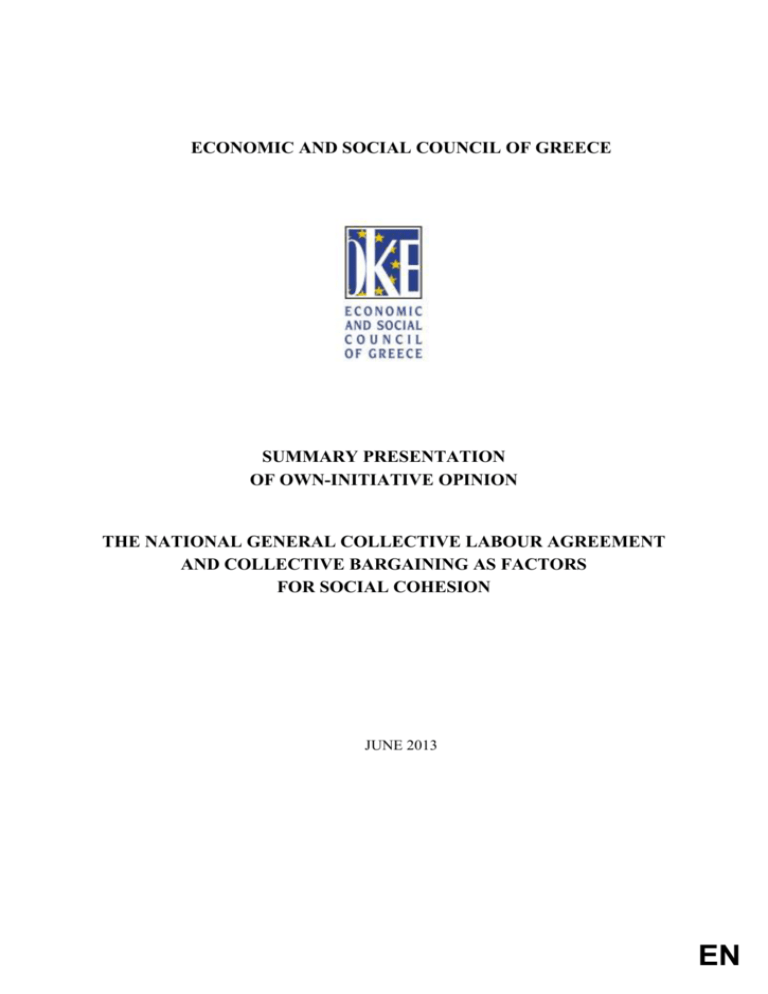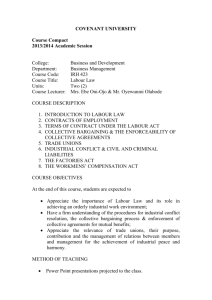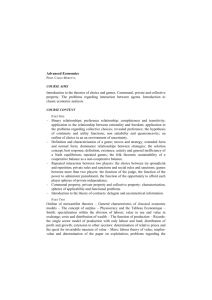summary presentation of the own-initiative opinion of the greek esc
advertisement

ECONOMIC AND SOCIAL COUNCIL OF GREECE SUMMARY PRESENTATION OF OWN-INITIATIVE OPINION THE NATIONAL GENERAL COLLECTIVE LABOUR AGREEMENT AND COLLECTIVE BARGAINING AS FACTORS FOR SOCIAL COHESION JUNE 2013 EN -2- Opinion 287 SUMMARY PRESENTATION We are all aware that collective labour agreements reflect the common ground between the specific group interests of workers and employers, which are shaped by prevailing economic and social conditions. Legislation over the last three years, implementing the terms of the memoranda, has brought radical change to labour law and collective bargaining arrangements. They have forcibly overturned the components of the negotiating balance between the social partners, and downgraded the necessary coordination in determining pay- and non-pay related employment terms that stands in the way of unfair competition based on labour costs. An attempt is being made to base the "competitiveness" of the Greek economy on the "famous" reforms. These consist of doing away with the possibility of extending collective agreements and with the most favourable regulation principle; reducing the possible period of extended validity from six to three months; placing the emphasis on company -level agreements that can be signed by "associations of persons" - entities that lack any basis in law -; making recourse to arbitration subject to a joint request from both sides, virtually doing away with the mediation services provided by OMED (Organisation for Mediation and Arbitration); limiting the binding nature of collective agreements, including the National General Collective Labour Agreement, to members of employers' organisations; and setting the minimum wage by law. The very real economic crisis and the national debt crisi s are being used to impose all of the above, leading to the erosion of labour rights and collective bargaining. Intensive State interventionism affecting all new regulation deals a grave blow to collective autonomy, leading to deregulation of labour laws that protect workers as the weaker parties in labour relations. The crisis is continuing however, in spite of the undermining of collective bargaining. Competitiveness continues to develop in the opposite direction to that sought. Poor competitiveness, a long-standing feature of the Greek economy, has proved to be impervious to the continual reductions in wages and the dismantling of labour relations. According to the World Economic Forum, Greece's position in terms of competitiveness has fallen by six places over the last two years. On the other side, the continuing closure of thousands of businesses, relocation of large companies abroad, collapse of insurance funds, shrinking private consumption as a result of the rapid nominal fall in incomes combined with the drastic squeeze on public investment, expenditure and consumption has plunged the Greek economy into recession and triggered a vertiginous rise in unemployment. The number of unemployed has quadrupled over the last five years, affecting more than 1.2 million people. Unemployment rose from 7.3% in May 2008 to 27% in EN -3November 2012, and was, according to forecasts, expected to have risen to 29% at the beginning of 2013. The unemployment rate is highest among young people aged 15-24 (57.8%), while the longterm unemployment rate (65.3%) is also particularly worrying. The ESC's position is that given the deep structural breakdown of the Greek economy, a policy for growth is needed, making choices that create a favourable business climate, boost innovation in companies and provide the necessary direction and support for the restructuring of the country's economic model. The question of competitiveness also needs to be addressed from this point of view and with these parameters - not with policies to deregulate labour relations. On the basis of the above observations, and being aware of what the forthcoming formal termination of the National General Collective Labour Agreement means for thousands of workers, the Greek Economic and Social Council has pressed ahead with drafting an own-initiative opinion on The National General Collective Labour Agreement and Collective Bargaining as Factors for Social Cohesion. The opinion examines the country's economic data and analyses the changes to labour legislation together with their impact on the labour environment. The key finding of the opinion is that the accumulation over many years of problems, and sometimes distortions, revealed by the present economic crisis, does not justify the drastic reversal in labour relations and collective bargaining laws. Sustainable economic growth and competitiveness are, by definition, incompatible with antilabour measures and the forcible uprooting of the legal framework for employment. Crucial elements such as social cohesion by means of social dialogue, collective bargaining and social agreements should in any case constitute the core of policies for growth and social well-being. It is expected that if the National General Collective Labour Agreement is terminated, pay reductions of 10% will occur as a result of the (possible) withdrawal of the marriage allowance, while pressure from the Troika to abolish "automatic pay increases", i.e. rises according to an official timetable, which are currently "frozen", threatens to push nearly all salaries down still further. The minimum wage, currently set at EUR 586 before deductions, is also under threat of reduction, as the Troika and, subsequently, the reforms under Ministerial Act 6/2012 and Law 4093/2012, links the level of the minimum wage with unemployment and competitiveness performance. However, while these new measures point to reductions in the coming months, a key role in the cuts is also played by the abolition of the vast majority of sectoral agreements (14 February 2013), which is expected to result in tens of thousands of working signing individual labour contracts. It is already calculated that in all, the abolition of sectoral agreements during the last year has left at least 1 200 000 workers in the private sector - in other words, some 60% - entirely deprived of the protection provided by the terms of collective labour agreements, which came to an end with the signing of individual contracts with less favourable terms. In its 2012 Annual Report, the Labour Inspectorate notes the conversion of ever increasing numbers of full employment contracts into contracts for part-time or rotating jobs, decided unilaterally by employers. -4In the light of all these rapid developments, the ESC's proposals highlight the importance of collective bargaining in ensuring social cohesion and the operation of the labour market, and in order to avoid unfair competition based on labour costs. Crucial elements such as social cohesion by means of social dialogue, collective bargaining and social agreements should in any case constitute the core of policies for growth and social prosperity. What is needed, then, is a reinforcement, not weakening, of collective bargaining, restoring the balance between the social partners, so that the parties can seek and find new common ground within the framework of a fair dialogue. The National General Collective Labour Agreement, as the highest-level collective labour agreement, should be brought back into general application for all workers in the country, and its historic role should continue as the economic basis for all collective agreements in the country, giving legislative cover to the outcome of dialogue and agreements between the social partners. As a final measure, the protection of thousands of workers at the present time, demands that those provisions of the National General Collective Labour Agreement that have not yet been incorporated in legislation be confirmed in law. _____________





![Labor Management Relations [Opens in New Window]](http://s3.studylib.net/store/data/006750373_1-d299a6861c58d67d0e98709a44e4f857-300x300.png)

